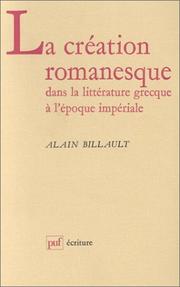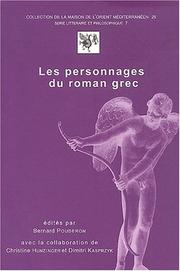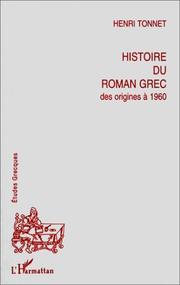| Listing 1 - 10 of 16 | << page >> |
Sort by
|
Book
Year: 1998 Publisher: New York Oxford Athens Clarendon Press
Abstract | Keywords | Export | Availability | Bookmark
 Loading...
Loading...Choose an application
- Reference Manager
- EndNote
- RefWorks (Direct export to RefWorks)

ISBN: 0415085063 0415085071 9780415085076 Year: 1994 Publisher: London Routledge
Abstract | Keywords | Export | Availability | Bookmark
 Loading...
Loading...Choose an application
- Reference Manager
- EndNote
- RefWorks (Direct export to RefWorks)
Fiction --- Classical Greek literature --- Greek fiction --- Roman grec --- History and criticism --- Histoire et critique --- Greece --- Grèce --- Civilization --- Civilisation --- Littérature grecque --- --Fiction --- --Greek fiction --- History and criticism. --- Civilization. --- Grèce --- Greek fiction - History and criticism --- Greece - Civilization

ISSN: 02221179 ISBN: 2130433901 9782130433903 Year: 1991 Volume: vol *84 Publisher: Paris PUF
Abstract | Keywords | Export | Availability | Bookmark
 Loading...
Loading...Choose an application
- Reference Manager
- EndNote
- RefWorks (Direct export to RefWorks)
Fiction --- Classical Greek literature --- Greek fiction --- Narration (Rhetoric) --- Roman grec --- Narration --- History and criticism. --- History --- Histoire et critique --- Histoire --- -Greek literature --- History and criticism --- -History and criticism --- Romances [Greek ] --- Greek fiction - History and criticism.
Book
ISBN: 9789004175471 9004175474 9786612401145 1282401149 9047428919 9789047428916 9781282401143 6612401141 Year: 2009 Volume: 310 Publisher: Leiden : Brill,
Abstract | Keywords | Export | Availability | Bookmark
 Loading...
Loading...Choose an application
- Reference Manager
- EndNote
- RefWorks (Direct export to RefWorks)
This collection of essays offers a comprehensive examination of texts that traditionally have been excluded from the main corpus of the ancient Greek novel and confined to the margins of the genre, such as the Life of Aesop, the Life of Alexander the Great, and the Acts of the Christian Martyrs. Through comparison and contrast, intertextual analysis and close examination, the boundaries of the dichotomy between the “fringe” vs. the “canonical” or “erotic” novel are explored, and so the generic identity of the texts in each group is more clearly outlined. The collective outcome brings the “fringe” from the periphery of scholarly research to the centre of critical attention, and provides methodological tools for the exploration of other “fringe” texts.
Greek fiction --- Byzantine fiction --- History and criticism --- History and criticism. --- Roman grec --- Roman byzantin --- Histoire et critique --- Byzantine literature --- Greek fiction - History and criticism --- Byzantine fiction - History and criticism
Book
ISBN: 0691069417 1306985153 0691608849 1400863384 9781400863389 9780691069418 9780691608846 Year: 1995 Publisher: Princeton, N.J. Princeton University Press
Abstract | Keywords | Export | Availability | Bookmark
 Loading...
Loading...Choose an application
- Reference Manager
- EndNote
- RefWorks (Direct export to RefWorks)
The recent discovery of fragments from such novels as Iolaos, Phoinikika, Sesonchosis, and Metiochos and Parthenope has dramatically increased the library catalogue of ancient novels, calling for a fresh survey of the field. In this volume Susan Stephens and John Winkler have reedited all of the identifiable novel fragments, including the epitomes of Iamblichos' Babyloniaka and Antonius Diogenes' Incredible Things Beyond Thule. Intended for scholars as well as nonspecialists, this work provides new editions of the texts, full translations whenever possible, and introductions that situate each text within the field of ancient fiction and that present relevant background material, literary parallels, and possible lines of interpretation.Collective reading of the fragments exposes the inadequacy of many currently held assumptions about the ancient novel, among these, for example, the paradigm for a linear, increasingly complex narrative development, the notion of the "ideal romantic" novel as the generic norm, and the nature of the novel's readership and cultural milieu. Once perceived as a late and insignificant development, the novel emerges as a central and revealing cultural phenomenon of the Greco-Roman world after Alexander.Originally published in 1995.The Princeton Legacy Library uses the latest print-on-demand technology to again make available previously out-of-print books from the distinguished backlist of Princeton University Press. These editions preserve the original texts of these important books while presenting them in durable paperback and hardcover editions. The goal of the Princeton Legacy Library is to vastly increase access to the rich scholarly heritage found in the thousands of books published by Princeton University Press since its founding in 1905.
Classical Greek literature --- Greek fiction --- Lost literature --- Roman grec --- Oeuvres perdues (Littérature) --- History and criticism --- Translations into English --- Histoire et critique --- Traduction en anglais --- Traductions en anglais --- -Greek fiction --- -Lost literature --- Greek literature --- Literature --- Greek fiction. --- History and criticism. --- Translations into English. --- Oeuvres perdues (Littérature) --- Greek fiction - Translations into English --- Greek fiction - History and criticism --- Lost literature - Greece

ISBN: 0415070058 9780415070058 Year: 1996 Publisher: London Routledge
Abstract | Keywords | Export | Availability | Bookmark
 Loading...
Loading...Choose an application
- Reference Manager
- EndNote
- RefWorks (Direct export to RefWorks)
Greek fiction --- -Byzantine fiction --- Literature and society --- -History and criticism --- History and criticism --- Byzantine fiction --- -Greek fiction --- -Literature and society --- -Literature --- Literature and sociology --- Society and literature --- Sociology and literature --- Sociolinguistics --- Greek literature --- Byzantine literature --- Social aspects --- History and criticism. --- Greece --- Greek fiction - History and criticism --- Byzantine fiction - History and criticism --- Literature and society - Greece

ISSN: 02445689 ISBN: 2903264228 9782903264222 Year: 2001 Volume: 29 7 Publisher: Lyon Maison de l'Orient méditerranéen
Abstract | Keywords | Export | Availability | Bookmark
 Loading...
Loading...Choose an application
- Reference Manager
- EndNote
- RefWorks (Direct export to RefWorks)
Greek fiction --- Characters and characteristics in literature --- Roman grec --- Personnages dans la littérature --- History and criticism --- Fiction --- Histoire et critique --- Roman --- Personnages dans la littérature --- Greek literature --- Character sketches --- Characterization (Literature) --- Literary characters --- Literary portraits --- Portraits, Literary --- Congresses --- Greek fiction - History and criticism - Congresses --- Characters and characteristics in literature - Congresses

ISBN: 2728801584 9782728801589 Year: 1992 Volume: 4 Publisher: Paris : Presses de l'Ecole normale supérieure,
Abstract | Keywords | Export | Availability | Bookmark
 Loading...
Loading...Choose an application
- Reference Manager
- EndNote
- RefWorks (Direct export to RefWorks)
Greek fiction --- Roman grec --- History and criticism --- Histoire et critique --- Literature and society --- Fiction --- Congresses. --- Greek influences --- -Greek fiction --- -Literature and society --- -Literature --- Literature and sociology --- Society and literature --- Sociology and literature --- Sociolinguistics --- Greek literature --- Metafiction --- Novellas (Short novels) --- Novels --- Stories --- Literature --- Novelists --- -Congresses --- Congresses --- Social aspects --- Philosophy --- -Greek influences --- Greek influences&delete& --- History and criticism&delete& --- Greek fiction - History and criticism - Congresses. --- Literature and society - Greece - Congresses --- Fiction - Greek influences - Congresses. --- Antiquite

ISBN: 0415262097 0415262100 0203282698 1134505582 1280069244 020316721X 9780203167212 9780415262095 9780415262101 9781134505531 9781134505579 9781134505586 1134505574 9781280069246 Year: 2003 Publisher: London Routledge
Abstract | Keywords | Export | Availability | Bookmark
 Loading...
Loading...Choose an application
- Reference Manager
- EndNote
- RefWorks (Direct export to RefWorks)
The Greek novel occupies a special place in the debate on gender in antiquity, forcing us to ask why the female protagonists are such strong and positive characters. This book rejects the hypothesis of a largely female readership, and also sees a problem in ascribing this pattern to the reflection of a blanket improvement in the status of women. Katharine Haynes shows that the strong heroines are best understood not as an undistorted mirror on an improved social reality, but as a type of 'constructed feminine'. The book offers a wealth of fascinating insights into the kaleidoscopic world of male and female in the Greek novel, which will inform and illuminate the reader whatever the text being studied. The related issues of ethnicity and self-definition also explored will be of interest for all those working on ancient fiction or the culture of the Second Sophistic.
Greek fiction --- Women and literature --- Femininity in literature. --- Women in literature. --- History and criticism. --- Femininity in literature --- Women in literature --- Greek & Latin Languages & Literatures --- Languages & Literatures --- History and criticism --- Femininity (Psychology) in literature --- Woman (Christian theology) in literature --- Women in drama --- Women in poetry --- Roman grec --- Femmes et littérature --- Féminité dans la littérature --- Femmes dans la littérature --- Histoire et critique --- Greek fiction - History and criticism. --- Women and literature - Greece.

ISBN: 2738446396 9782738446398 Year: 1996 Publisher: Paris L'Harmattan
Abstract | Keywords | Export | Availability | Bookmark
 Loading...
Loading...Choose an application
- Reference Manager
- EndNote
- RefWorks (Direct export to RefWorks)
Byzantine fiction
---
Greek fiction
---
Greek fiction, Modern
---
History and criticism.
---
875 <09>
---
-Greek fiction
---
-Greek fiction, Modern
---
-#BIBC:ruil
| Listing 1 - 10 of 16 | << page >> |
Sort by
|

 Search
Search Feedback
Feedback About UniCat
About UniCat  Help
Help News
News